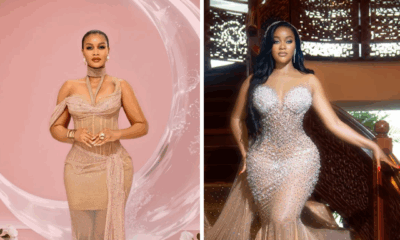Features
Rejoice Abutsa: Karibi Fabura – The Good Guy That Never Went Bad

In 2018, I briefly met Karibi Fubara at the Africa Magic Viewers’ Choice Awards (AMVCA) in Lagos. It was my first time at the event, and I arrived at the Eko Hotel and Suites with great confusion, unable to understand what I was to do before the award ceremony began. My intention for the night was exciting: I was there on official duties; my friend was nominated for his first award as a filmmaker; and I was excited that I had scheduled a quick get-together with some filmmakers that I intended to forge stronger ties with.
Somehow, my early arrival was the catalyst to my confusion. Although I had been working in the film industry for a while, I had never been to a big award show, and I would find that arriving early to the AMVCA meant having to wait for the activities on the red carpet to end before the real show began. An awards night is also not the place to sustain conversations about film, as I would find. Everything was fast-paced; conversations were easily interrupted, friends disappeared amid the bustle, and everyone wanted a great photo, so camera flashes were a thing to contend with. Restlessness took hold of me and eventually led me to Karibi, who was attending the event with fashion curator and stylist, who became his wife, Yolanda Okereke Fubara. I immediately started a conversation about his growing career, and whenever I think of that night, I am always struck by how our conversation was filled with the generosity he offered my curiosity and observation.
Most notably, Karibi insisted that his career was a continuance of moments and movements that preceded him. That is, “we would not know of a Karibi, without the persistence of the likes of Ramsey Nouah, Richard Mofe Damijo, Jim Iyke, and many other actors that insisted on a career in film when it was not cool.” To Karibi, honour must be given when due. As he insists in several other conversations, by entering Nollywood, he had collected an important baton. He had such hope that his path in film would allow him to chart new territories for those to come after. The encounter of that evening confirmed to me that several of the characters we saw Karibi Fubara play on screen were mirrored from life. Karibi was calm, charismatic, compassionate, and generous. After the AMVCA, I would see him at several other film events in Lagos and each time, this truth was emphasised.
In what appears to be a short career, Karibi was involved in several productions that have come to define Nollywood’s Web Genre. The Web Genre, while largely focused on romance stories, has seen several filmmakers utilise the democratic distribution model that is provisioned by the internet to explore all sorts of archetypes. Although Web Genres benefit filmmakers and their audience, who can easily access storytelling from wherever, it has also generated a plethora of opportunities for actors. The Web Genre has enabled filmmakers to hire new faces without putting such monetary estimates on what an established actor or a “big cinema actor” would achieve at the box-office. The rhetoric that often accompanies Web Genres in Nigeria is that, if the story is good, the internet will do the rest of the work to ensure its success. Word of mouth is most effective with Web Genres, and because it does not conform to the political particularities of Cinema-distributed films, it is where new actors find the celluloid mass to showcase their skills.
These changes in the industry provided new faces like Karibi opportunities to enter an industry with scarce opportunities. Although one of Karibi’s early appearances in Nollywood can be traced to his role as Obi in Gidi Up (2013); he arguably entered our hearts by playing Akin in Before 30 (2015). His appearance in Before 30 propped him up in many ways. He was appearing in a series with O.C. Ukeje, Damilola Adegbite, and Gideon Okeke, all, who were becoming household names in Nollywood. The show’s intense focus on the lives of four women drooled on societal perspectives about the population of women in Nigeria outpacing that of men. It also drew attention to gender ageism in the context of Nigeria. In its sophisticated jocular to these issues, it naturally gifted the male characters attention, since they complicated the lives of the women we were experiencing on screen. If men are in short supply, what do the available ones have to offer our favourite female characters?
The cultural and psychological imperative of Before 30, made Karibi as Akin, one of the important roles in the series. Perhaps, the decision to cast him in a role that pacified Temilola Coker’s (Damilola Adegbite) trouble with men resonated with several female fans, who may note that with his appearance, a burial was given to toxic masculinity. As a comment under an episode of the show on YouTube reveals: “good men exist.” And in Akin, we saw that scarcity should not equate or celebrate character deficiency. Flaws and all, he was an improvement from Temilola’s stack of troubled exes. When Temilola’s confusion threatens to distort her relationship with Akin, the decision to end the first season at that particular moment, triggered a desire to see more of Akin. Whether through a continuation of his relationship with Temilola in season 2, or in other places.
Even though the question of what makes a “good man” is complicated, Nollywood’s continuance of morally motivated and gender-ordering narratives allows us a clear demarcation between the good and the bad. Too often, Nollywood condemns female characters that defy ascribed gender roles. As we may see by consistently mapping the terrain, female characters are often written with the obligation to overturn bad boys into good ones. To define the “bad boys” of Nollywood would be to signal the serial daters, those whose emotions are destructive to themselves and their female counterparts, and in a final example, they are those whose association with women depend on the exhalation of machismo. Simply think of any of the actors we associate with being “the bad boy of Nollywood” and the memories that have categorised them provide a response to how chauvinism layers such representational politics.
Karibi’s legacy on film does not place him at the centre of “bad boy” excitement. From his appearance on Before 30, one could see a male character whose idea of masculinity was not steeped in serially dating all the women in Lagos before the appearance of “the one” shaped him into a better human being. In fact, through his filmography, one never gets the sense that it is the obligation of the female characters who appear beside him, to reconstruct his behaviour.
Karibi featured in stories that practised reciprocity between the sexes. One could see this exemplified in Men, Money Marriage and The Smart Money Woman. As Francis in God Calling; as Nnamdi in Castle & Castle; and as Femi in Fractured, he emotes bravery, insecurity, nobility, vulnerability, goal-orientation, fear, and reliability – spheres of human complexities that are not gendered, or relegated to male failure or achievement. To peruse Karibi’s filmography would be to note that he may have become an archetype, because he thrived so well in embodying the characters he played. Certainly, credit must be given to the writers who wrote the characters he played into life, because can we really experience an actor without the input of a great writer?
But there is also an argument to make for an actor, whose ability to say yes or no to a script defines how we experience cultural productions. In this case, it is important to celebrate the intentionality that now forms Karibi’s filmography. He designed his involvement in film so much that it moves the gaze from an over glorification of toxic masculinity to one that enables a nuanced discourse on gender reciprocity and equality, in the romance stories he often featured in. For those who followed the trajectory of Nnamdi from watching Castle & Castle 2, his attitude towards his wife, Nneka, and her career, may be interpreted as a case of male dominion, however, this notion loses some validity if we were to observe the progression of their relationship from season 1. There are instances that point to domination, however, more than this, Nnamdi projects the anxieties of unpursued dreams and the fear of being dispensable due to his limited contribution to societal labour.
Chaos always follows death. In the case of Karibi, there is a tranquillity that followed both his career, his death, and I hope, his legacy. Colleagues and friends have shared stories of a friend who despite his personal challenges, always spared the time and words, to comfort their own troubles. For the rest of the industry, we may begin to trace or gauge impact. In doing so, one such thing we must locate is that Karibi may have handed over the baton too early, but it was done so with no small significance on the cultural importance that the human perspectives represented on screen project in life. If we are utterly charmed by the characters he played on screen, we should also acknowledge that, rather than play the script he was given, he left us a script to play by.




















